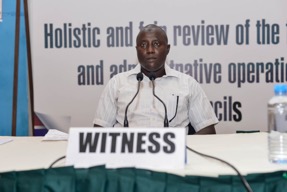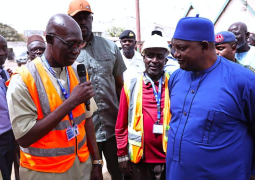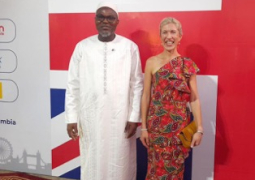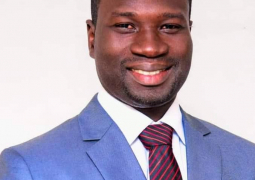
The revelation was made at the Commission by the budget officer of the Basse Area Council, Ousman Touray, who was heard before the Commission on Thursday.
Mr Touray was appointed in 2008 as a revenue collector. He rose through the ranks to become a senior revenue collector, before eventually becoming accounting assistant in January 2020. In August of the same year, he was appointed the budget officer.
He attained AAT (Association of Accounting Technicians) Certificate in 2009 and is currently pursuing accountancy at the University of The Gambia.
Mr Touray notified the Commission that he is a member of the Budget and Finance Committee with Director of Finance Lamin Suso, Yuba Jabang, AlieuKijera, Planning Officer Yaya Ceesay are also members.
The witness said they sit over budget matters when the time of budget is due. He said they end sittings once they have finalised the budget preparation.
For the financial matters, the witness said the Committee is ineffective and dysfunctional because they don't sit frequently.
Mr Touray also testified that he does not have an assistant in his unit and is answerable to both the CEO and the director of finance. He acknowledged his participation in the budget preparation for 2021 and 2022.
He said when they prepare the draft budget, it is sent to the General Council for approval.
The witness also claimed that the Local Government Service Scheme does not capture the role of a budget officer. He explained that PFM made the recommendation for the council to appoint a budget officer.
However, Chairperson Jainaba Bah referred the witness to section 9 of the Local Government Finance and Audit Act, which outlines the role of a budget officer. The witness said he had not seen the Act before.
On how they do the budgeting, the witness said it starts from the village development committees, who submit their projects in relation to development to the ward development committees, and then it will be sent to the planning unit for costing. The witness said it would be included in the budget and then submitted to the General Council for Approval.
At this point, Commissioner Oreme E. Joiner interjected, asking: "When doing the budget, do you look at the actual of the previous budget before preparing a new budget for the following year?".
"Of course," the witness responded.
The commissioner pressed with the variant projections of the council and the amount collected. However, the witness said the estimation comes from the finance department.
"What I have noticed is that you used the same estimation for 2016 and 2017," Commissioner Joiner said.
"Yes, but I was not working as the budget officer at the time," the witness said.
"If you are repeating your budget estimates for different years, is it not that you are confident that such revenue exists?" Commissioner Joiner said.
The witness agreed.
"Is there a possibility that it [revenue] was collected and not deposited in the council's account?" Commissioner Joiner asked.
"Yes," the witness said.
The witness argued that in budgeting, the revenue sources must be known first, and that an assessment should be carried out. He said their revenue sources are the rates and taxes, licenses and market duties and canteen fees.
He also said that the Basse Area Council had not received grants from 2020 to date. However, Chairperson Jainaba Bah referred the witness to the budgets of the council showing that they have been receiving subvention.
In preparing the budget, the witness said they rely on "mere estimation".
However, Counsel Patrick Gomez rebutted the witness’s claim: "It is not a mere estimation. The actual truth is you will know the amount of money you will generate at the Basse Area Council in a given year.
The witness gave in and agreed with the deputy lead counsel.
On what guides the spending of the budget, the witness testified that they prioritise personal emoluments like salary and allowances, and other recurrent expenses, such as fuel. He added that they have a development budget too.
Ousainou said the GPPA forms have portions for the budget officer to sign, to indicate that there is fund available for a certain expenditure.
"Is the Director of Finance doing that job? I challenge that with GPPA and my CEO, but they did not give me an answer," the witness said.
The witness also testified that since 2020, he has not signed more than 10 forms. He added that the director of finance signed the overwhelming majority of the GPPA forms.
He said if the procurement unit prepares forms they should pass through his office for signature, but the director of finance was doing that.




